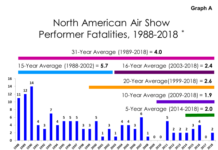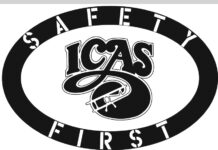As the 2010 air show season draws to a close, the air show industry “buzz” has been mostly positive. It appears that we will have another year with no fatal air show accidents in North America. Attendance reports have been unusually strong, particularly during the last third of the season. And preliminary indications are that we will also have an increase in attendance at our annual Convention in Las Vegas. Although there are still many ICAS members who continue to feel the impact of our struggling economy, the consensus seems to be that there will be a return to normalcy in 2011.
Interestingly, even as our industry’s public appearance receives more positive exposure, we continue to struggle with an intra-industry problem that has plagued the business for many years.
Professionalism.
During the first few years of the twenty-first century, the air show business has been in a state of transition. The industry has moved beyond the Mom-and-Pop operations that were the norm in the middle part of the twentieth century. But we’ve not quite made it to the strictly professional level that many desire and which characterizes other spectator event businesses (professional sports, amusement parks, car racing, etc.). The problems that we’ve seen this year have mostly come when twenty-first century expectations have come into conflict with twentieth century execution or fulfillment.
A few examples from the 2010 air show season:
· A sponsored performer agrees to forego a portion of his performance fee in return for certain services to be provided by the event organizer that help the performer meet the obligations he has to his sponsor. But the services aren’t provided as agreed to in the written contract.
· A paid performer agrees – either verbally or in a written contract — to participate in certain events associated with the event during air show weekend, but then reneges on that agreement or simply doesn’t show up.
· An event organizer refuses to return – or even acknowledge — phone calls, e-mails and written correspondence from performers and support service providers.
· A performer ignores multiple requests from an event organizer for video footage and publicity photos, making it difficult for the event organizer to effectively promote the participation of the performer in an upcoming air show.
· An event organizer fails to provide minimum logistical support – port-a-potties on the flight line, smoke oil pumping capabilities, food and water – required for performers to safely and effectively entertain the air show spectators.
· After signing a contract that specifies a certain number of hotel rooms and cars, a performer shows up early and unannounced, and asks for additional hotel rooms and/or cars.
Fortunately, there is still room in the air show business for a certain amount of informality. Of the 300+ air shows conducted in the North America each year, more than half attract less than 15,000 spectators and many are just one-day long. Similarly, a significant number of the pilots who perform at air shows in the U.S. and Canada only fly at two or three shows per year.
But, too often, the sometimes-informal and still-in-transition nature of the business suggests to some in the air show community that they can straddle, committing themselves and their organization to the highest levels of professionalism when it suits them, but feeling no obligation to conduct their air show business in a professional manner at other times.
As an industry, our events have long since passed the point when they can represent themselves as a top-tier air show and then fail to deliver on the most basic contractual obligations to performers and support service providers. Similarly, the performers in our business have moved beyond the time when they can position themselves as a national headline act and then under-perform on issues as simple as providing promotional materials, staying sober at the sponsor party, or showing up at the autograph tent at the agreed upon time.
Most air show professionals recognize that event organizers can express themselves clearly when they encounter this kind of lack of professionalism by not inviting a performer back if he/she has underperformed, acted embarrassingly or been otherwise difficult to work with. Just as clearly, this is not an option for many performers. Depending on their circumstances, performers are often obligated to smile, say thank you and ignore even the most unprofessional and disrespectful behavior by the event organizers who have invited these performers to participate in their air shows.
Poor execution and lack of professionalism among some in our industry reflects poorly on the whole business. It keeps the air show industry from making forward progress and, in certain cases, it keeps our air show colleagues from achieving the goals that they set for themselves and worked very hard to attain. It’s not necessary that everybody in the air show community have similar goals or expectations, but all of us should be able to expect – at a minimum – professional and considerate behavior among our colleagues.








